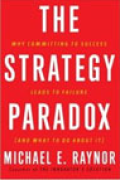My Account
Subscriptions
Summary Categories
Summary Collections
- Career & Life Satisfaction Collection
- Disruptive Innovation Collection
- Exceptional Leadership Collection
- Great Employees Only Collection
- Hidden Gems Collection
- Marketing Collection
- Must-Read Books for 2012 v1
- Must-Read Books for 2012 v2
- Must-Read Books for 2013
- Self-Help Collection
- Small Business Collection
- Strategic Assessment Collection
- Strategic Genius Collection
- Take Charge Collection
- Team Management Collection
- Ultimate Sales Collection
- Web Marketing Collection
Summary List
The Strategy Paradox:Why committing to success leads to failure (and what to do about it)
Michael E. Raynor
Summarized October 2007
Type: [SUMMARY]
SKU: 10072
ISBN: 0385516223
Price: $12.50
Available Formats:




Purchase Summary
Summary Description
Everyone knows what a company needs to be successful: a compelling vision, bold leadership, and decisive action. But, unfortunately, those drivers of success are almost always the drivers of failure as well.
The reason? Managers must make choices with far-reaching consequences today, but most base those choices on assumptions about a future they cannot predict. It is this collision, between commitment and uncertainty, that creates the bewildering condition known as the strategy paradox.
Answering those questions is the goal of The Strategy Paradox: Why Committing to Success Leads to Failure [and What to do About it], by Michael E. Raynor,
Raynor co-authored The Innovator's Solution with Clayton M. Christensen. He is a Distinguished Fellow at Deloitte Research in Boston and an adjunct professor at the Richard Ivey School of Business in London, Canada.
In The Strategy Paradox, Raynor explains, through vivid examples at major companies such as Sony, Vivendi, and Johnson & Johnson, that failure is not always a result of poor planning or execution. It is often great planning and execution…coupled with bad luck.
This is the central dilemma of the strategy paradox. Any future strategy, even one that is perfectly designed and executed, may well fail, because the future cannot be predicted. So what should companies do?
The only way that companies can successfully plan for the future is by separating making strategic commitments from managing strategic uncertainty. Only then can companies make the bold choices that hold the promise of greatness without accepting the risk of total ruin.
In this summary, you’ll master a concrete framework for strategic actions that will allow you to overcome the strategy paradox and seize today's opportunities while simultaneously preparing for tomorrow's promise.
 Member Log In
Member Log In